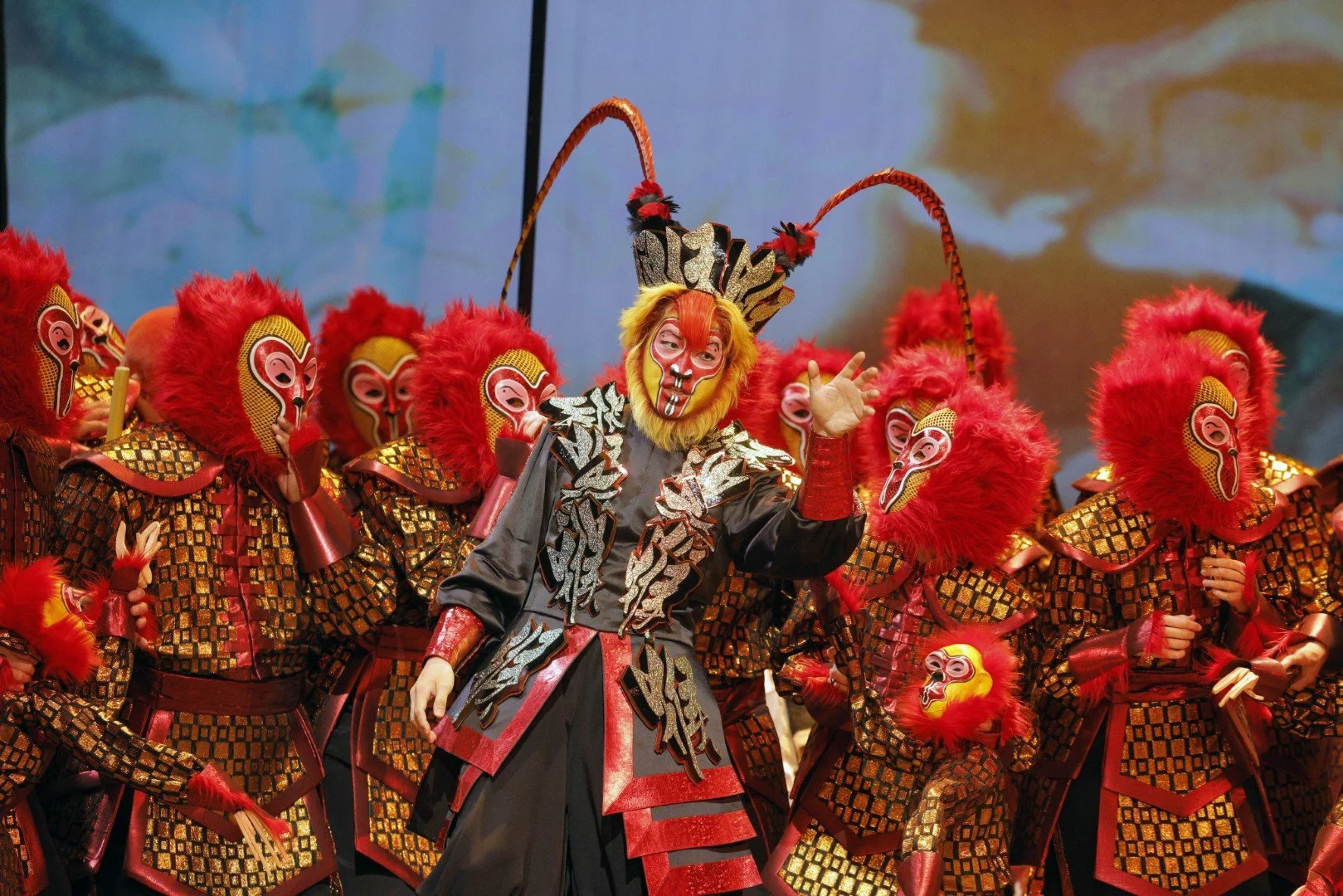Monkey is King in San Francisco
/By Elsa Tranter
11/22/2025
Photo credit: Cory Weaver
San Francisco Opera ended its fall season 2025 with a big bang—a much anticipated world premiere that was a spectacular show! The opera is The Monkey King with music by Huang Ruo and lyrics by David Henry Hwang. The two have collaborated on several previous operas including An American Soldier and M Butterfly (the latter from the very successful stage play written by Mr. Hwang).
The energy and general “buzz” on the night I went—the third performance of eight—was palpable even before the opera started. There were Chinese dragons performing in the lobby with flashing lights, exhibits relating to the opera, several places for dramatic ‘selfie’ photographs and a general air of great expectation. At a special tableau on the central table in the lobby there was even a designated volunteer to take photos of patrons in front of it. The audience upped its game as well and there were more than the usual number of elaborately costumed patrons, including many young people who seemed to be having lots of fun—there’s hope for the future yet.















And then the curtain went up and we were in for a wild ride exploring the travels and travails of the mythical superhero monkey who challenges men and gods in his efforts to become immortal. The opera is based on a Ming Dynasty novel that is considered one of China’s four greatest literary classics and the story is as familiar to people of Chinese descent as is Superman to Americans. There is a fair amount of Buddhist philosophy worked into the opera, done in a way as to seem completely logical. During his exploits that range from the depths of the sea to the gods in heaven, monkey is stymied and beaten down, only to rise again. Such a special creature is the monkey that he has three personifications: a singer, a dancer and a puppet. The singer, Australian-Chinese tenor King Wang, made a brilliant debut in the role and he was expertly joined by dancer Huiwang Zhang. The puppet, like the almost 50 others, was ably backed by a crew of black clad puppeteers. The monkey was cunning and charismatic, charming and wily in voice (a bright and clear tone) and in body and by the end of the evening the three almost melded into one in the way that they interacted. It was a stellar conceit.
Other starring roles were sung by tenor Konu Kim as the Jade Emperor; soprano Mei Gui Zhang as Guanyin the Chinese goddess of compassion; bass Peixin Chen as the Supreme Sage Laojun; baritone Joo Won Kang in the dual roles of Dragon King and Lord Erlang (which has a puppet double as well, Marcos Vedovetto); mezzo-soprano Hongni Wu in the dual roles of the Crab General and Venus Star; and bass-baritone Jusung Gabriel Park as Master Subhuti—who turns out to be the Buddha. All of them were in fine voice and seemed genuinely well-suited for their roles. Ms. Zhang’s soprano was especially clear, bell-like and soaring throughout the evening, standing out among the many male performers.
The music was lyrical and pleasing to the ear—it ranged from what seemed like early Gregorian chants to lively dance-like tunes to the emotionally dramatic. There was a good balance of Eastern and Western influences—the many Asian style percussion instruments and the pipa (a Chinese lute) emphasized this. Under the baton of Maestra Carolyn Kuan (making her San Francisco Opera debut) the orchestra of 53 played well throughout.
Not to forget the chorus—it almost goes without saying that they will be good, but of course it MUST be said—they were excellent as usual, under the direction of John Keene. They fill out the stage in many scenes as well as sing in perfect unison.






Stage Director Diane Paulus brought the complex staging together in a seamless fashion. Especially notable were the dozens of puppets under the direction of Basil Twist —they ranged from six white horses (my favorite) to five mountains, representing the five fingers of Buddha. The costumes (Anita Yavich designer) were lavish and inventive and very colorful. The lighting design by Ayumu “Poe” Saegusa; the choreography by Ann Yee, and the projection design by Hana S. Kim, all aided by Peking Opera Specialist Jamie Guan, were flawless. The most spectacular element of the stage design included thousands of yards of specially made curtains (of silk and other materials) which appeared throughout the opera, rising and falling, billowing and collapsing, almost like they too were characters.
The opera is sung in English (except for Guanyin and the Buddha who sing in Mandarin). There are English supertitles in their usual place above the proscenium and traditional Chinese ones on both sides of it. This is not the first time for duo-language supertitles but is one of only a few since the first in 2016.




Performances in the coming weeks include November 20, 22, 25 and 28 (all at 7:30 PM) and November 30 at 2:00PM. The opera lasts 2 hours 20 minutes with one 25 minute intermission. There are very few tickets available; the best bet for seeing it is to purchase a $10 standing room ticket (available on day of performance) or to purchase a $25 ‘on demand’ ticket for the window between 10 AM November 23 and 10 AM on the 25th. In addition to the performances there are a number of other events around San Francisco to enhance the experience of the opera. See the opera’s website for more information.
Elsa Tranter is a Bostonian who has lived in Berkeley for over 50 years and has been an opera goer for most of those years. She worked as a graduate student adviser at UC Berkeley and still attends Cal Performances regularly. Her favorite composer is Wagner and her favorite opera is Les Troyens.

